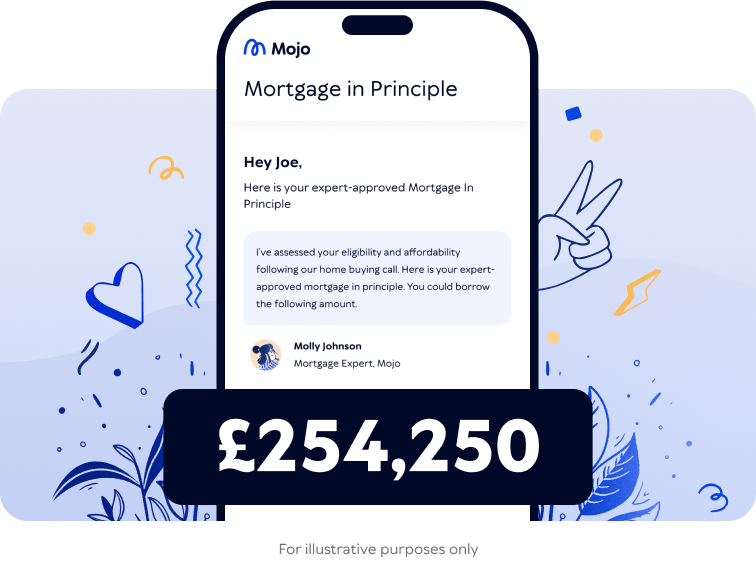Low income mortgages
Dreaming of owning your own home but worried your income might hold you back? Buying a property on a tight budget is often more achievable than it feels.
Our mortgage brokers are here to help find the right solution for you. Let’s dive into what your mortgage options are if you have a low income.

Quick summary:
Getting a mortgage may be possible, even if you have a low income
However, how much you earn will impact how much you’re able to borrow
Lenders assess lots of different factors in addition to your income, including your outgoings, deposit size and credit history
You may be able to take advantage of homeownership schemes designed to help first-time buyers and those with low incomes get on the property ladder
Working with a mortgage broker could help you navigate your options
It’s important to remember that definitions of what 'low income' is can vary depending on individual circumstances. However, having a low income shouldn’t automatically prevent you from getting a mortgage. Lenders may have minimum lending criteria, though, and your final lending amount will be based on a full affordability assessment, so it could be worthwhile speaking to a mortgage expert. There are options available, and understanding them is the first step.
Can I get a mortgage on a low income?
It’s certainly possible. Whether you’re able to qualify for a mortgage depends on lots of different factors, including how much you earn. So getting a mortgage on a low income is all about finding a solution that's manageable and affordable for you.
While some lenders may have a minimum income requirement, especially for certain types of mortgages like buy-to-let or high loan-to-value (LTV) mortgages, most will focus on whether you’re able to comfortably afford the monthly mortgage repayments alongside your other expenses.
To assess your affordability, lenders consider a range of factors beyond just your income, including:
-
Personal information (such as your age)
-
Deposit size
-
Outgoings
-
Income reliability and consistency
-
Credit history
-
The kind of property you want to buy
So, if increasing your income isn’t possible at the moment, you may still be able to access a mortgage by focusing on other aspects, such as improving your credit score or saving for a bigger deposit.
How much can I borrow on a low income?
It's true that generally, the higher your income, the more you might be able to borrow. Lenders often use a multiple of your annual salary, typically around 4 to 5 times, to determine the potential loan amount.
So, for someone aged 21 or over working full-time (37.5 hours a week) and earning the minimum wage (£12.21), their annual salary before tax would be £23,809. Based on a borrowing multiple of 4.5 times this income, a lender may be willing to offer around £107,141 for a mortgage.
This might seem like a low mortgage size, particularly given the average UK house price is currently £268,200. However, as we mentioned earlier, you’ll be able to significantly boost your home buying budget by saving for a larger deposit.
For example, if you had a £50,000 deposit alongside the £107,141 mortgage mentioned in our previous example, your total buying power would be around £157,140.

Check out our low income mortgage calculator
Our mortgage calculator will give you an initial estimate of how much you could afford and how much your mortgage might cost each month.
Play around to see how deposit size and income can impact your buying budget.
How to get a low income mortgage
Your options might feel more limited if you’re on a lower income - but that doesn’t mean the property ladder is out of reach. Here are just a few ways to improve your chances of getting a mortgage.
While low deposit mortgages can help you get on the property ladder sooner, a higher deposit could improve your chances of qualifying for a mortgage as you’ll be seen as a lower risk to lenders. A larger deposit reduces your loan-to-value (the percentage of your property’s value that you need to borrow), which could help to make your mortgage payments more affordable and can lead to more competitive interest rates.
Your credit history gives lenders an idea of how you’ve handled debt in the past. If you have a good track record of managing money, you stand a better chance of being accepted for a mortgage.
Check your credit report for accuracy, focus on paying your bills on time and use credit wisely, to show you’re a reliable borrower.
Lowering your outstanding debts reduces your monthly outgoings, showing lenders you have more capacity to afford your mortgage payments.
Lenders will want to know where your income is going every month. It’s important to showcase good spending habits - particularly in the run-up to applying for a mortgage. If you can avoid those pricey takeaways or cut back on subscriptions, it could be worthwhile doing so.
Buying with someone else can help boost your affordability, as the lender will look at both of your incomes when deciding how much you can borrow.
Looking at properties in a lower price range means you'll need to borrow less, which can increase your chances of approval. You might have to make a few compromises while house hunting but it could help you get on the property ladder sooner.
There are several government schemes and other initiatives out there designed to help make the path to homeownership more affordable, including:
Shared ownership: buy a share of a property (between 25% and 75%) and pay rent on the rest
First Homes scheme: allows eligible first-time buyers to buy a new build home for up to 50% less than its market value
Rent to Buy: pay rent at a reduced rate so you can save the money you’re not using on rent for a deposit
Lifetime ISA: save up to £4,000 a year, and the government adds a 25% bonus (up to £1,000 annually)
Right to Buy or Right to Acquire: allows tenants to buy their council or housing association home at a discount
Deposit Unlock scheme: offers the opportunity to buy a new build home with a deposit as low as 5%
A broker can provide tailored advice based on your circumstances. They have access to a wide range of lenders, including those who may be more willing to lend to lower-income applicants. Your broker will even offer advice on the best ways to improve your application to set you up for success.

“There’s no two ways about it - buying a home is expensive. There are lots of additional costs to consider, from legal fees to stamp duty. It’s so important to budget for all of these extra expenses in addition to your deposit, to get a true idea of how much you need to save to buy a property.”
Luke Butcher, Chief Revenue Officer
Will a bigger deposit help me to get a mortgage on a low income?
Yes, it can. While it's possible to secure a mortgage with a lower deposit, offering a larger one can strengthen your mortgage application. That’s because borrowing a smaller percentage of the property’s value reduces risk for lenders, which can help you access better rates and potentially increases how much the lender might be willing to offer you too.
We understand that setting aside a chunk of money each month can be challenging on a lower income, especially with plenty of other demands on your finances. However, there are a few different ways you can boost your deposit, including:
-
Use a gifted deposit: A family member (or perhaps even a close friend) may be willing to contribute towards your deposit. Lenders will usually require a letter from the individual providing the gift, confirming that the money is non-repayable and that they hold no interest in the property.
-
Research guarantor, family assisted or Joint Borrower Sole Proprietor (JSPB) mortgages: These mortgage options allow family members to support your application by boosting your affordability without necessarily owning a share of the property
-
Utilise government schemes: Explore options like the Lifetime ISA, which adds a 25% government bonus to your savings (up to £1,000 per year)
While having a large deposit demonstrates financial responsibility, it won’t guarantee you’ll be accepted for a mortgage. Lenders will still conduct a full affordability assessment to make sure you can comfortably manage your monthly repayments. So it’s well worth assessing your credit history and keeping a close eye on your outgoings whilst building your deposit.

Find out how much you could borrow with a free mortgage in principle
Discover your maximum potential mortgage amount across a wide range of lenders. Get started by telling us a bit more about you and the type of property you want to buy.
FAQs
In the UK, a low-income household is commonly defined as one where the net household income is below 60% of the median income of the UK population. The median disposable household income is £34,800, meaning households earning less than £20,880 could be considered to have a low income.
Don’t focus too much on stats and averages, though. What really matters is how much you earn and how much you need to buy a property. A mortgage broker will treat you like an individual, and will tailor their advice to suit your personal circumstances.
Each lender will have their own criteria and attitudes to different income sources when assessing mortgage affordability. Many will accept other forms of income in addition to your employed or self-employed income, such as:
Bonuses, commission and overtime
Child maintenance payments
Benefits
Rental income
Pension funds
Investment income
You will almost certainly need to provide evidence of any additional income, to show it is being received regularly.
If you receive other forms of income, it could be worthwhile consulting a mortgage broker to help compare your options. They know lender criteria inside out, so can recommend the ones most likely to accept your specific income mix.
It can be more challenging to secure a mortgage if you have a low income and a poor credit history. That’s because lenders may view you as a higher-risk applicant.
However, that doesn’t mean homeownership is impossible. Specialist lenders, also known as sub-prime lenders, cater specifically to those with adverse credit history - though they may charge higher interest rates.
Most lenders will consider applicants who receive certain types of benefits. However, not all lenders accept every type of benefit, and some may have stricter rules if benefits are the sole source of your income.
Benefits that may be accepted by some lenders include:
Attendance Allowance
Carer's Allowance
Child Benefit
Child Tax Credit
Disability Living Allowance (DLA)
Employment and Support Allowance (ESA)
Industrial Injuries Benefit
Maternity Allowance
Pension Credit
Personal Independence Payment (PIP)
Universal Credit
Widow's Pension
If your lender accepts your benefits as income, you’ll need to provide clear evidence to prove the regularity and amount of your payments, similar to how you’d prove employment income with payslips.
A mortgage broker’s advice can be invaluable here. They’ll be able to help you identify the most suitable lender for your circumstances.
Yes, it’s possible to get a mortgage if you’re earning minimum wage or even slightly below it. A lower income can impact the amount you’re able to borrow, though, so you may wish to look at ways to bridge the gap between your maximum mortgage amount and the cost of your dream home. For example, you may need to search for more affordable properties or focus on boosting your deposit.
You’ll need to prove your income to show your mortgage lender that you can comfortably afford the repayments. In addition to your personal bank statements, here’s what you’ll usually be asked for:
For employed income: your most recent payslips. If you get bonuses or overtime, you might need to provide additional payslips to prove these are regular sources of income
For self-employed income: usually two to three years of your SA302 Tax Calculations and Tax Year Overviews from HMRC
For benefits: latest award notice for each separate type of benefit you receive
For child maintenance: a copy of the agreement (court ordered or Child Maintenance Service agreements) and/or bank statements demonstrating regular payments
For pensions: your latest annual pension statements or latest payslip from your pension provider
For other income: criteria varies, but you’ll likely need to provide proof in the form of official letters or bank statements showing consistent payments